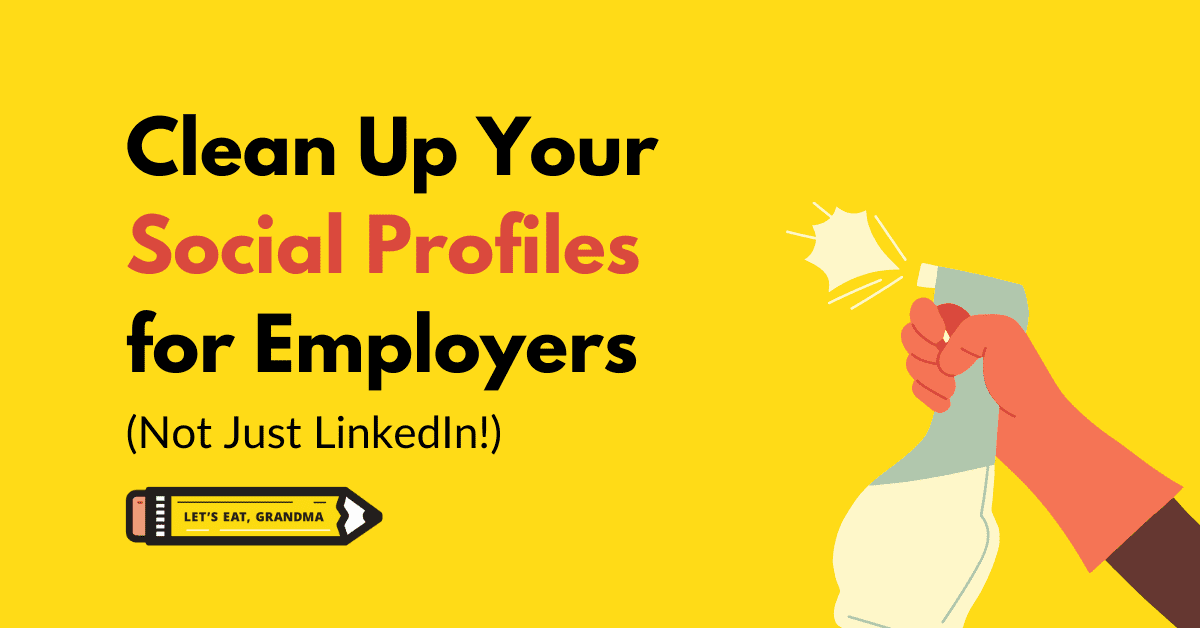Employers Are Vetting Your Social Media for Hiring (and Not Just Your LinkedIn)

So you’ve been carefully curating your LinkedIn profile – but what about your other social media accounts? Research shows you should make sure those are employer-friendly as well.
By: Jennifer Meehan | Contributor for Let’s Eat, Grandma
Social media is part of daily life. And it’s also an important part of your job search. You could have a perfect resume, cover letter and LinkedIn profile, but if you’re involved in an ugly political fight on Twitter, you may not even get an interview.
Just about everyone recognizes that LinkedIn is a valuable tool in your job search. (That’s why Grandma even offers a profile redo along with resume and cover letter writing.) Although you can post content as you would on social media, it’s really more of a business network. Make sure your LinkedIn profile is filled with relevant content, because we guarantee it will be checked by employers.
Want more job search tips? Sign up for our newsletter!
But your job search social media awareness shouldn’t be limited just to LinkedIn. A survey by CareerBuilder found that 70 percent of employers screen the social media profiles of prospective employees. Almost half of employers monitor their current employees’ social media presence. And over half of employers have decided not to hire a candidate based on their social media posts.
You’re not safe once you have a job, either. About a third of employers reported reprimanding or firing an employee based on their social media.
You have to think twice about what you post on Facebook, Twitter, Instagram, and other social media accounts because the wrong content could mean serious trouble for your job prospects.
Know the Pitfalls
Here are some of the reasons the employers surveyed gave for firing, or not hiring, someone based on their social media presence.
- Provocative or inappropriate photos or other content
- Posts about drinking or using drugs
- Disparaging comments regarding race, gender, religion, etc.
- Lying about qualifications
- Bad-mouthing the former company or releasing confidential information
- Poor communication skills (your profile could be a model of restraint, but if it’s awkward and full of mistakes, hiring managers will notice)

It’s best to assume prospective employers will Google you. When in doubt, make it private! Photo by Austin Distel on Unsplash.
Just assume that prospective or current employers will see whatever is on your public accounts. A good rule of thumb is to avoid any of the subjects you shouldn’t bring up during Thanksgiving dinner: race, religion, and politics. And pictures of your last spring break in Fort Lauderdale.
But that doesn’t mean you need to delete all your accounts. In fact, the survey found that employers are just as likely to object to no online presence or even posting too little! Social media is a powerful tool for good as well as bad.
There are a few best practices to handle your social media accounts for your job search.
Make Your Activity Private
I almost missed out on a good job because I didn’t make my Facebook account private. About 12 years ago I interviewed for a PR/communications job at a research organization. I thought nothing I posted could possibly affect my job search. I didn’t even check my page very often. At some point I had “liked” a post by an activist and somehow accidentally ended up joining a Facebook group that advocated violent protest. Fortunately, I was able to convince the senior management that I did not knowingly join the Facebook group, and I got the job.
I hadn’t had a clue that they would check. However, especially now, assume that any company you interview with will. It’s perfectly legal and hiring managers like seeing something of your personality as they make their decisions.
Create Different Accounts
Some experts recommend creating professional accounts in addition to your personal, private ones restricted to a few trustworthy friends.
This is a great opportunity to showcase all the positive things you’ve done. But you need to vary your professional content across platforms. Instagram would be perfect for posting photos of you doing volunteer work in the community, like working at a food pantry. You could also show moments at work when everyone is enjoying themselves at a (non-drinking) event.
Your public Facebook page could feature some family occasions and posts about noncontroversial subjects like environmental causes or literacy programs. The same goes for Twitter, where you might post recipes or reviews of good books you recommend.
Curate Your Content

Posting about your hobbies could create a rapport with an interviewer. Photo by Conscious Design on Unsplash
Check for older posts that could be damaging or embarrassing. They don’t represent who you are now. Either delete or archive them. While you’re at it, make sure your username sounds businesslike. Some 22 percent of employers in the survey cited an unprofessional name as one of the reasons to pass on a candidate.
Also review your connections and the people you follow on Twitter. Someone you decided to follow a few years ago may have been innocuous at the time, but she could have turned into an anti-puppy activist.
Most important, regularly monitor your accounts for anything objectionable. It could save you from an uncomfortable conversation, or worse, no interview at all.
Of course, be truthful and always, always proofread anything you write. If your editing skills aren’t great, ask someone else to read it for you.
Use It to Your Advantage
Think of social media as another professional tool. It’s here to stay and will only grow in importance. You might as well embrace it. Posting about hobbies and interests could even help build rapport with an interviewer who also enjoys cooking or building bird houses.
Let your online presence shine, and it will only help to land those interviews and jobs.
Want more job search tips sent straight to your inbox? Sign up for our newsletter here:
Better Resume.
Satisfying Career.
Happier You.
